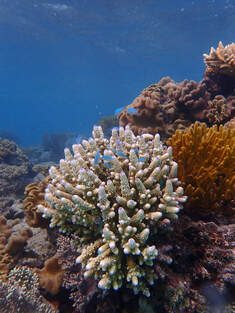 It took a few years but the last (and arguably coolest!) chapter from my PhD was published today in the journal Communications Biology. In this study, we tested how the long-lasting social bonds associated with familiarity impact anti-predator behavior (known as the fast-start response) in a schooling coral reef fish, Chromis viridis (pictured to the left, photo credit Amy Cox). In social animals living in the wild, individuals rely on their buddies to alert them if a predator is lurking, but they need to balance the risk of being eaten against the wasted energy of reacting to inaccurate information. So, individuals will alter their sensitivity to social information based on the level of familiarity in the group (and hence trust in the information’s accuracy). Through greater trust in social information, familiarity thus maximizes the benefits of group living, for example, by minimizing aggression, enhancing cooperation, and increasing lifespans. In this study, we showed that familiar groups react more quickly and with greater speed following a simulated predator attack than groups composed of unfamiliar individuals. These effects were driven by a combination of greater vigilance by the first fish to detect the predator (also known as the response initiator) and more effective information sharing with neighboring fish. As escape performance underpins survival of predator attacks, these results help us to understand why animals have evolved to prefer associating with “friends” rather than “strangers”, due to the implications for both individual and group-level survival in the wild. Check out the paper here: https://www.nature.com/articles/s42003-021-02407-4
0 Comments
|
Archives
April 2023
Categories |
 RSS Feed
RSS Feed